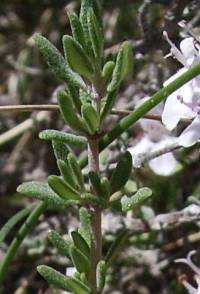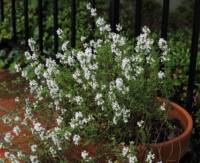This is an old revision of the document!
Thyme
| Botanical Information |
| Order | Lamiales |
| Family | Lamiaceae |
| Genus | Thymus |
| Common Name | Thyme |
| Species | T. vulgaris |
Maturity days
Planting Months
| Planting months |
| Jan | Feb | Mar | Apr | May | Jun | Jul | Aug | Sep | Oct | Nov | Dec |
| | | | | | X | | | | | | |
Permaculture uses
| Permaculture uses |
| Usage 1 | Usage 2 | Usage 3 |
| | | Herb |
| Growing Condition | Comment |
| Drought Tolerant | |
| Humidity tolerant | |
| Planting area | Garden_bed |
| Sunlight | Full_sun |
Photos
Bushy, woody based evergreen small shrub. Culiary uses, tea, ground cover. Propogated easily cuttings
Space plants: 25 - 30 cm apart Compatible with (can grow beside): Dry-environment herbs (oregano,sage), Eggplant, Cabbage Thyme is slow to grow from seed and is best propagated from root divisions or cuttings. Seeds need to be started in a warm frost- free place. A greenhouse is ideal. Keep under cover until about 10cm (4in) high, then harden off by putting outside during the day and inside at night for about a week. Transplant the young plants into their final positions, in well-drained soil in full sunlight. Harvest sparingly in the first year. Root divisions, from 3 or 4 year old plants, can be taken in late Spring and then planted into a sunny spot. Water sparingly once established and avoid feeding. The plants will have most flavour in Summer months. Thyme dies down in the winter, if frosty, but a good layer of mulch round the plant will protect the roots and provide enough food to keep it growing.

